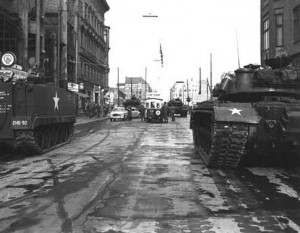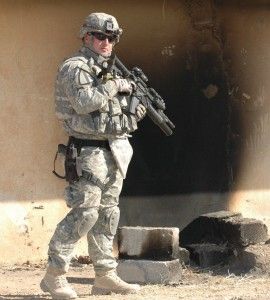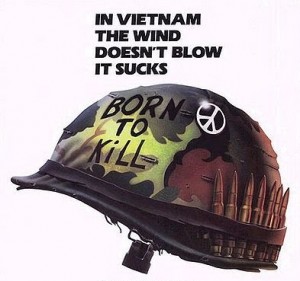No Army Marches into Battle Alone
Although not new by any means, the privatization of the military was foreseen as early as 1993 by futurists Alvin and Heide Toffler in their book War & Anti-War:
The idea is nothing new - no army in history has ever marched one step without private enterprise providing everything from boots and uniforms to meals, weaponry, tires, spare parts and maintenance - in an earlier era horseshoes - and of course the horses themselves and the feed they ate.
 Berlin, 1961, height of the Cold War
Berlin, 1961, height of the Cold War
The Tofflers’ book was timely because it coincided with the immediate end of the post-Cold War Era; hallmarked by the fall of the Berlin Wall in 1989 and the Soviet Union two years later. The First Gulf War against Saddam Hussein - a long-time client of the Soviet Union - was viewed by many historians as an epilogue of the Cold War.
At that point in history it was immediately evident that there was no longer a requirement for a huge standing military; the Communist Block had imploded and the commonly-held belief was that a kind of World Peace would ensue.
The need for a standing military along the lines of World War II armies was over; the United States had long since dispensed with the draft and had gone with a conscription-free, all-volunteer professional army. To streamline operations, to enhance the flexibility this new army requires, many functions have been contracted out. While the Army still has cooks and mechanics, most overseas mess halls are staffed by locally hired civilians, and military motor pools include qualified technicians representing commercial suppliers such as Land Rover.
I joined the U.S. Army in 1983. Infantry, Airborne, 11 Charlie. Our squad leaders and platoon sergeants were professionals, and they told us horror stories of serving amongst draftees of the Vietnam era; drugs, rampant crime within the ranks, disciplinary problems in garrison AND in combat.
We listened and learned; whatever the Army threw at us, we were willing to deal with, because we wanted to be there. What we DIDN'T want; was to be with people who didn't want to be there. We were professionals.
Everywhere I served overseas, our operations were enhanced by civilian contractors. They ran the mess halls, fixed our radios, issued boots and uniforms, and in very extraordinary circumstances served in a paramilitary role, providing us with security details, training resources and even sources of intelligence. Of these activities there is nothing unethical, illegal, unorthodox or new in any way.
It is my professional opinion that it is better - and CHEAPER - to hire civilian contractors to perform service functions - to include personal security details - than to add these "garrison" duties to troops who should be out on patrol, taking the fight to the enemy.
 Byron Cousin, an instructor of battlefield forensics, briefs students of his class. Cousin spent 18 years with the 82d Airborne Division, where he retired in 2006 as a first sergeant. On this day, his students were 82d Paratroopers.
Byron Cousin, an instructor of battlefield forensics, briefs students of his class. Cousin spent 18 years with the 82d Airborne Division, where he retired in 2006 as a first sergeant. On this day, his students were 82d Paratroopers.
Consider: a uniformed soldier has to be recruited, armed & equipped, fed, paid, kept healthy, trained, paid, housed, educated (and his FAMILY has to be housed, fed, medically taken care of and educated) and then paid retirement for X # of years. A contractor just has to be paid, point blank and simple.
Since I retired from active duty I have provided goods and consulting services to the Department of Defense, the Department of Homeland Security, and to various state and local law enforcement agencies. At this time, I am a professional security consultant. There is nothing unethical, irregular, or illegal in any of these activities. I provide a service, and a perspective, that an active duty soldier simply could not perform. I am paid well for what I do, and this is exactly what I am worth - less than, if anything.
To anyone out there who suggests the United States should revert to involuntary conscription, populate the Army with unwilling draftees who don't want to be there, and tie up the military performing chores outside of the military role or mission, I ask: what are the details of your honorable military service?
Originally posted at STORMBRINGER.






